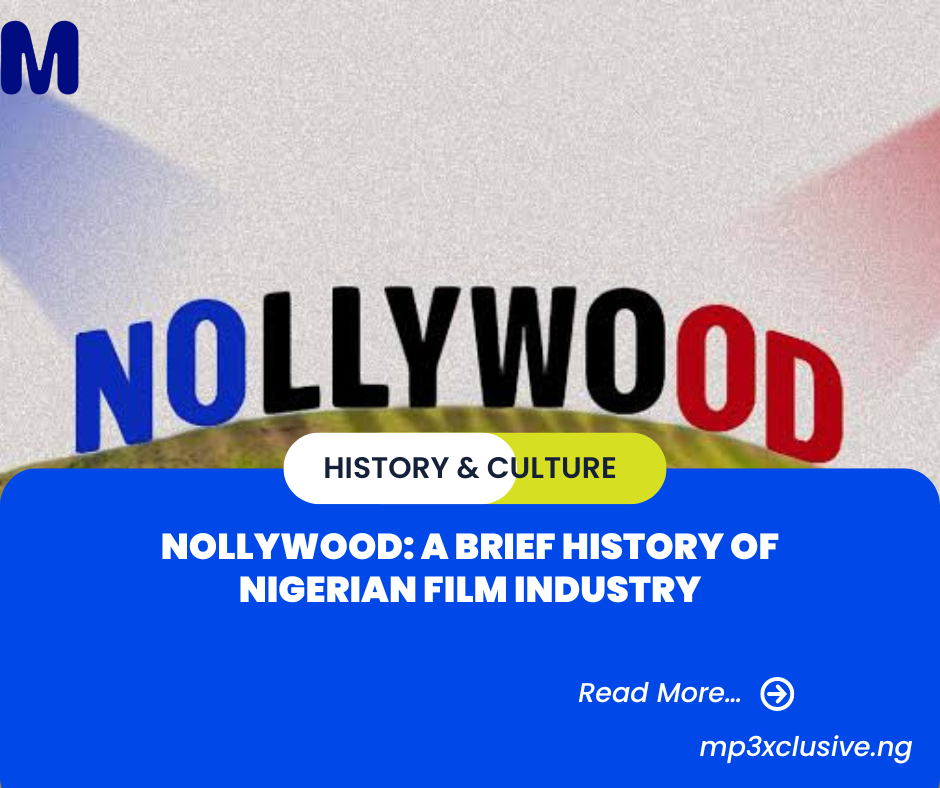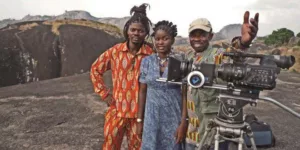Nollywood: A Brief History Of Nigerian Film Industry

Nigerian film industry widely known as “Nollywood” is the second largest film industry in the world and one of the good things that happened to Nigeria as a whole.
This is a comprehensive documentary on the history of Nollywood and the earliest movies.
The Nigerian film industry has over the years spread like wide fire throughout the coast of Africa, Europe, and surprisingly, Nigerian homemade movies are loved even in Asia.
Several Nigerian Actors and actresses have gained international recognition, fame and fortune beyond their wildest imagination by starring in several Nigerian films
Hot Posts
What is Nollywood
Nollywood is referred to as Nigeria Film Industry .
History Of Nigerian Film Making
The Nigerian version of Movie productions started over fifty years ago with the like of Latola Films (1962) and Calpeny Nigeria Ltd anchoring the escapade.
Historically, Latola Films was the first and earliest film production company in Nigeria, started movie production as far back as 1962.
Calpeny Nigeria Ltd spearheaded the production of the first Nigerian film – Kongi’s Harvest, based on a play written by Wole Sonyika.
As far back as 1980 most movies produced in Nigeria were either short plays or culled from a book, the major problem was resources and adequate equipment. Despite all of that the Nigerian film industry thrived…
I watched it as it scurried away from one constraint to another until the birth of Nollywood – the umbrella body covering everything movie, from production to distribution in Nigeria.

A shop selling film VCD/DVDs in Lagos. Nollywood has turned film into a mass consumption cultural good / Photo: Bic Leu
The Name Nollywood was coined to resemble the big shots in the industry – Bollywood and Hollywood which are the Indian film industry and that of American respectively.
Men like Kenneth Okonkwo, Kanayo O Kanayo and Bod-Manuel Odogwu are the Nigerian version of die-hard actors.
They made my first impression of what a film looks like, they starred alongside other selected Igbo casts in the earliest of Nigerian home video – Living in Bondage, Produced by Kenneth Nebue when films were shot with VHS cameras and edited in television studios using a couple of (gone extinct) VCR machines.
Several others that participated in the making of Nollywood (behind the scene) includes Ola Balogun, Eddie Ugbomah, late Hurbert Ogunde, Adeyemi Afolayan a.k.a Ade Love (Kunle Afolayan’s father), Ladi Ladebo, Moses Adejumo, Adebayo Salami and Afolabi Adesanya
These men “The Yoruba Travelling Theatre Groups” took their works beyond the stage and delved into movie production using the Celluloid format as far back as 1970.
They were actually the first Nigerian filmmakers, although their several movies actually never made the big bang!
These great men made movies like KONGI’S HARVEST in 1971, BULLFROG IN THE SUN in 1974, BISI DAUGHTER OF THE RIVER in 1977, JAIYESIMI in 1980, CRY FREEDOM in 1981 and many other great movies in the seventies and eighties.
Also: 8 Interesting Facts About The Yoruba People
The early nineties, of course, brought LIVING IN BONDAGE, CIRCLE OF DOOM and GLAMOUR GIRLS; all of these Nigerian movies were funded and produced by Kenneth Nnebue – now addressed as Evangelist Kenneth Nnebue.
The Nollywood that we know today had its expansion and influx of smart young actors and actresses in the early part of the twentieth Millenium, great actors and actresses were shot into limelight, the likes of Genevieve Nnaji, Richard Mofe Damijo, and Stella Damascus saw an opportunity in role interpretations and took it.
Before then were even men like Nkem Owoh whose comic movies have crossed the borders of the African continent to almost all parts of the world.
The likes of Pete Edochie, Enebeli Elebeuwa, Peter Bunor, Alex Usifo, Klint da Drunk, saint Obi, Olu Jacobs, as well as Liz Benson would never be counted out of the – history book – of Nollywood.
Facts About Nigerian Movies and History

On set for Aruba movie
Although “the Yoruba traveling theater group” pioneered the earliest movies in Nigeria, Kenneth Nnebue was the first to spearhead the production of a movie in Nigerian – Living in bondage which actually gave life to movie production in Nigeria.
Every role interpreter in Nollywood is under an umbrella body – AGN (actors Guild of Nigeria) often headed by a president unanimously chosen by the group in an election.
The AMAA award is the most prestigious award in Nollywood, showcasing and rewarding great talents in Nigerian and Africa as a whole.
The AMAA (African Movie Academy Award) was created in 2005 and has since become the most – hungered after – event in the African movie world.
Nigerian movies are collections of different genres and themes – themes of romance, revenge, betrayal, love, hatred, Ritual, politics or a blend of two or more.
On the average, Nollywood make movies in about two to three week and about 50,000 copies are sold both in Nigeria and in Diaspora.






1 Comment
Comments are closed.